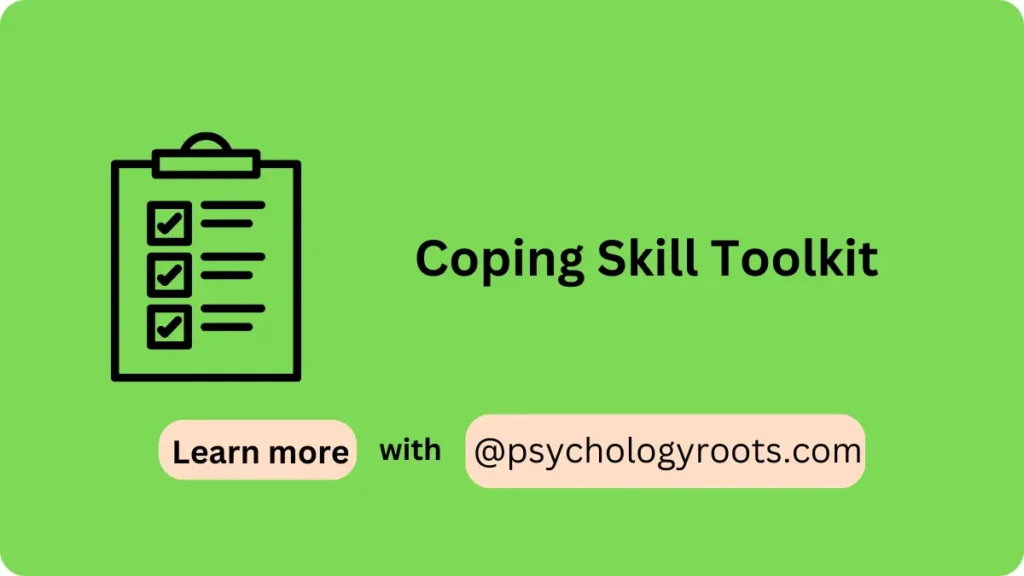Table of Contents
Coping Skills Toolkit
Here in this post, we are sharing the “Coping Skills Toolkit”. You can read psychometric and Author information. We have thousands of Scales and questionnaires in our collection (See Scales and Questionnaires). You can demand us any scale and questionnaires related to psychology through our community, and we will provide you with a short time. Keep visiting Psychology Roots.
About Coping Skills Toolkit
Scale Name
Coping Skills Toolkit
Author Details
Varies by specific toolkit, often created by mental health professionals, educators, or organizations specializing in psychological well-being.
Translation Availability
Not Sure

Background/Description
The Coping Skill Toolkit is a collection of strategies, exercises, and resources designed to help individuals manage stress, emotions, and challenges in daily life. Coping skills are essential for maintaining mental health and well-being, as they enable individuals to navigate difficult situations, reduce emotional distress, and build resilience.
Coping skills can be categorized into various types, such as problem-focused coping (addressing the source of stress), emotion-focused coping (managing emotional responses), and avoidance coping (minimizing exposure to stress). A well-rounded Coping Skill Toolkit typically includes techniques from each category, allowing individuals to tailor their coping strategies to their specific needs and situations.
The toolkit is often used in clinical settings, educational environments, and self-help contexts. It can be particularly beneficial for individuals dealing with anxiety, depression, trauma, or other mental health conditions, as well as for those seeking to improve their overall emotional well-being. The Coping Skill Toolkit is also valuable in preventative care, helping individuals build resilience before stress becomes overwhelming.
Administration, Scoring and Interpretation
- Assessment of Needs: Individuals or professionals begin by assessing the specific stressors, challenges, or emotions that need to be addressed. This may involve reflection, journaling, or discussions with a therapist or counselor.
- Selection of Tools: Based on the assessment, appropriate coping strategies are selected from the toolkit. These may include mindfulness exercises, relaxation techniques, cognitive restructuring, problem-solving skills, or creative outlets like art or music therapy.
- Implementation: The selected coping skills are practiced regularly. This might involve daily mindfulness meditation, scheduling problem-solving sessions, or practicing deep breathing during stressful moments. Consistent practice is key to making these strategies effective.
- Monitoring and Adjustment: Individuals should monitor the effectiveness of the coping strategies over time. If certain tools are not working, they can be adjusted or replaced with alternative strategies from the toolkit. Regular reflection or follow-up sessions with a mental health professional can help refine the coping plan.
- Integration into Daily Life: The ultimate goal is to integrate these coping skills into daily routines so that they become automatic responses to stress or emotional challenges. This may involve building habits around self-care, setting aside time for regular mental health check-ins, and maintaining a balanced lifestyle.
Reliability and Validity
The effectiveness of a Coping Skill Toolkit depends on the specific tools included and how well they are tailored to the individual’s needs. Research supports the effectiveness of many common coping strategies, such as mindfulness-based stress reduction (MBSR), cognitive-behavioral techniques, and relaxation exercises, in reducing stress and improving mental health.
Reliability and validity are often assessed through outcome studies that measure improvements in mental health symptoms, stress levels, and overall well-being. Many tools within the toolkit, such as cognitive-behavioral strategies, have been validated through extensive research and are widely recognized in the field of psychology.
Available Versions
Multiple-Items
Reference
Ms. Patrice Davis, Intervention Supervisor
Important Link
Scale File:
Frequently Asked Questions
Q: What is a Coping Skill Toolkit?
A: A Coping Skill Toolkit is a collection of strategies, exercises, and resources designed to help individuals manage stress, emotions, and challenges in daily life.
Q: Who can benefit from a Coping Skill Toolkit?
A: The toolkit can benefit anyone looking to improve their mental health and well-being, particularly those dealing with anxiety, depression, trauma, or other mental health conditions.
Q: How do you choose the right coping skills from the toolkit?
A: The choice of coping skills should be based on an assessment of the specific stressors or emotional challenges faced by the individual. Tailoring the strategies to the person’s needs is crucial for effectiveness.
Q: Can coping skills be practiced on a daily basis?
A: Yes, many coping skills are designed to be integrated into daily routines, helping individuals build resilience and better manage stress over time.
Q: How do you know if the coping skills are working?
A: Effectiveness can be monitored through self-reflection, journaling, or follow-up sessions with a mental health professional. Adjustments can be made if certain strategies are not effective.
Disclaimer
Please note that Psychology Roots does not have the right to grant permission for the use of any psychological scales or assessments listed on its website. To use any scale or assessment, you must obtain permission directly from the author or translator of the tool. Psychology Roots provides information about various tools and their administration procedures, but it is your responsibility to obtain proper permissions before using any scale or assessment. If you need further information about an author’s contact details, please submit a query to the Psychology Roots team.
Help Us Improve This Article
Have you discovered an inaccuracy? We put out great effort to give accurate and scientifically trustworthy information to our readers. Please notify us if you discover any typographical or grammatical errors.
Make a comment. We acknowledge and appreciate your efforts.
Share With Us
If you have any scale or any material related to psychology kindly share it with us at psychologyroots@gmail.com. We help others on behalf of you.